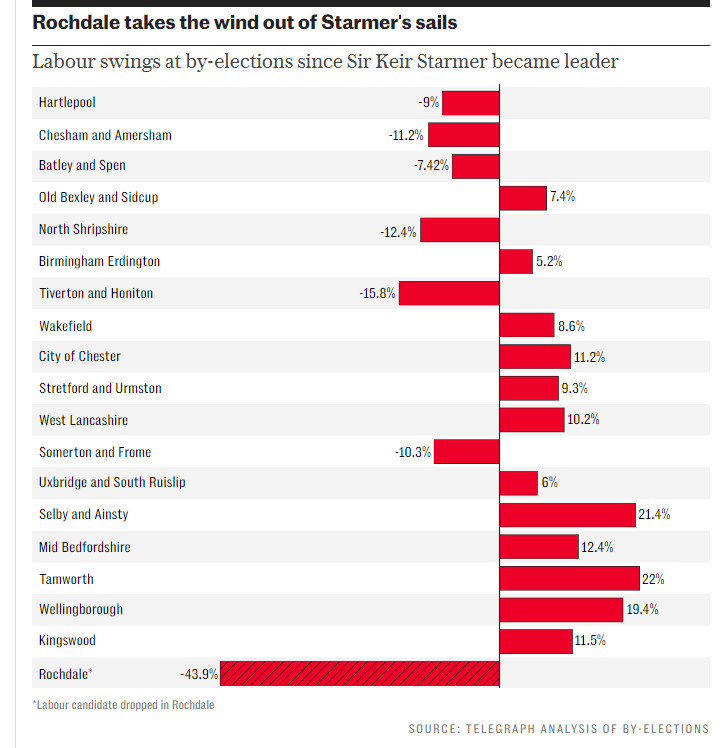George Galloway, not being a saviour after all, also fails to get the voters out
A democracy, as it has so neatly been described in the past, is a system whereby two wolves and a sheep vote for the details of the dinner menu. The author prefers to style it as the mob voting for socialism – just as the elite planned. Soviet era governments called themselves democracies – the German Democratic Republic, for instance, and they were entitled to. A democracy is form of government as an expression of public will, and in Marxism, the proletariat; i.e. the masses, create the form by becoming the “ruling class”. Thereafter, the government is the will of the people. If anyone wants to call it nonsense to justify an abuse, and insist that communist democracies were a contradiction in terms where the reality was the rule of an oligarchy of Party officials, then they are invited to say the same thing about so-called “liberal” democracy. In reality, to cast a vote in a “liberal” democracy is to signal approval of the “liberal” agenda – that which is good because it suits its engineers, and tolerance of which (at the very least) has been taught since everybody’s schooldays. It is exactly the same as voting for the uncontested Communist Party candidate in that sort of election†.
Like everything else that is designed to enslave in Britain, “liberal” democracy is largely a Victorian invention, and the UK was already on a pathway of transitioning from a form of constitutional republic to a democracy even as Marx – allied, then, with British aristocracy reacting against Georgian gentrification – was explicitly stating how it would be necessary for a country like Britain (steeped in its be-free/have-capital/have-a-say tradition) to implement democracy as a gentle route to socialism. Granting suffrage in Britain culminated in the first decades of the twentieth century – even at the same time as the designers of a socialist Britain were exploiting the First World War (as explained previously at FBEL).
But as clearly sinister as it is, democracy – oligarchic rule over a socialised people – is held up in Britain as a marvellous contrivance, which of course it would be when it is in the interest of the real ruling class for their governed to be delusional about the state of their liberty. And it was this delusion that was appealed to when Rishi Sunak, the current Prime Minister and figurehead of the front for the illusion of popular representation, took to the steps of 10 Downing Street the other week to denounce the threat to UK’s Democracy posed by burgeoning extremist tensions. It was the morning after the victory of George Galloway’s Worker’s Party (whatever it’s called) in the Rochdale by-election – which in itself, as Sunak’s implication went, was a constituent part of this apparent menace to Britain’s political utopia.
The idea, supposedly, was that Galloway’s victory was an expression of the mob that had lately been “criminal” in its anti-Israel protests – this as much as one who is barely paying attention to the latest circus understands it to be, at least.
Galloway responded, of course, saying that Sunak risked driving Muslims into extremism by their vote (for him) being illegitimated just because they stood against the political consensus, and also by their street demonstration being cast as something illicit requiring the drafting of new laws to produce criminalising definitions and appropriate new police approaches.
Notwithstanding, “pro-Palestinian” protests have continued since Galloway’s election, and he himself has ascended to his seat in Westminster.
All is rhetoric and all is theatre.
Except, there is, in all this, an element of UK Government being concerned about the image of Israel, and about a challenge to the politically correct arrangement of the World Order that ensures Israel, with Israel being necessary in it as London’s leverage into the middle east. Israel is supposed to be the eternal victim; its being seen in this light is what buoys support from protestant zealots in the United States (see the FBEL article about British Israelism) and guarantees (for the time being) its continued existence. So to have Israel being perceived as a heinous aggressor – as its conduct in the Gaza Strip is evoking – is a thing not to be tolerated.
If this challenge is seen to be legitimised by Galloway’s election as and MP, then in that respect it could be seen to be a threat. In the world of shadows and reflections created by London’s media, that is.
In reality, the risks would have been analysed, and it would have been decided by the people who contrive these things that Galloway has a function in maintaining or safeguarding the system that empowers London’s Government-by-hoax so that some apparent vindication for opposition against Israel will have been deemed acceptable.
Galloway, in fact, is not a threat. And what Rishi Sunak was doing in reacting as if he was addressing the nation upon the matter of an urgent crisis was making himself Galloway’s counterpoint for the sake of the Starmer Project: to deflect from how Labour had had a really poor by-election performance. Sunak’s intervention, in other words, was making the Rochdale by-election about Galloway versus himself so that no shine need be taken off Labour’s apparent ascendency into power.
Of the Starmer Project, and the utilisation in it of mostly spuriously generated by-elections, there is no further need to write here. The matter has been explained in these pages before [see “Starmer Project” keywords search results page]. The least we need to be reminded of is that it is important in these by-elections that Labour wins a seat, or the Tories lose one, and increasingly in a way that a swing to the former and away from the latter can be pointed to and called indicative of a great momentum putting Labour into power in the next General Election. As it is, in Rotherham, neither of those things happened. To make matters worse Labour had a failure exactly according to a measurement as has been established in these pages (as will be demonstrated).

Swing to Labour has been used by some in collusion to execute the Starmer Project as perhaps the key indicator of the party in unstoppable ascendency.
Now, the thing to consider is that if there were extraordinary measures to take the sting out of this failure (i.e. Sunak’s intervention), it’s quite possible that this election was a special case that wasn’t meant to fit the pattern: we do, after all, have to accommodate the fact that Labour sabotaged its own candidate, and had help in it from murky quarters. Somehow the Mail on Sunday was in full possession of the details of some remark (which one who didn’t know would guess had occurred in the course of a casual conversation) by Azhar Ali, who was branded “a wild and anti-Semitic conspiracy theor[ist]” as a consequence. All official electioneering for him was terminated, and he was suspended from the Party (although he remained on the ballot paper as the Labour candidate). This is what he said:
The Egyptians are saying that they warned Israel 10 days earlier [than Hamas’ October 7th attack]… [and the] Americans warned them a day before… there’s something happening… They deliberately took the security off, they allowed [it]… that massacre gives them the green light to do whatever they bloody want.
In a proper, free country this is not an unreasonable idea to express. However, a prospective MP for the Westminster Parliament – a potential shoo-in, in fact – would expect to ruin his chances by appearing to suggest in an official public statement that Israel permitted Hamas to create a pretext for its own military designs against Gaza. In fact, it is extremely odd that, given Ali could have only raised this matter in public in an off-the-cuff manner, it was yet recorded (secretly, or else Ali wouldn’t have opened his gob) and the incriminating material found its way into the hands of Mi7 (corporate-media division) and into the pages of a newspaper title. It looks like intelligence work. Starmer’s change of heart after adopting an initial position of standing by the Labour candidate is also suggests that someone had to put him right about the course of action he should take (corporate-media reported the cover for this as “Starmer under pressure”).
Additionally there is the evidence of Galloway’s mission, which became clear even in the hours after the election when he started to talk about the broader ambitions of his Worker’s Party. It became wholly apparent why there would be a desire to have him succeed against the official Labour candidate in Rochdale and allow him to establish an updated profile.
Asked if he believed his party could replicate his Rochdale success in other seats, Mr Galloway told GB News: “Yes, especially in this region. I don’t know what will happen elsewhere in the country but I have now received deputations from Bolton, from Oldham, from Blackburn, from Bury, and from Tameside in Greater Manchester, and that is just the deputations I have received.
“We have got 59 parliamentary candidates ready to go and we will stand in therefore three score Labour seats and either defeat them ourselves or cause their defeat and there will be independents, not Workers Party, but independents that we are ready to support who will stand up and down the country and I know of many already in the field who will now be energised by the result here tonight.”
(Source: ‘Labour’s worst nightmare’: George Galloway has 59 general election candidates ‘ready to go’ – Politics.co.uk).
The plan for Galloway, it seems, is to have him encourage general participation in elections. Although the political correspondent of The Guardian‡, Ben Quinn, lately writes that the Workers Party is “now on course to field as many as 90” candidates at the next general election largely, it seems, because of this outreach to “well placed independents”, it is the places named in association with an original 59 candidates in Galloway’s immediate reaction to winning Rochdale that gives the game away. The North West is prime so-called “Red Wall recovery” territory. This is where, according to the official narrative of the 2019 general election, Labour voters switched to the Tories, and where, in an upcoming national election, these voters need to be recovered to re-establish the seats as safe Labour (i.e. Red Wall).
In truth, as this site has explained exhaustively, there was no great switch of Labour to the Tories in the Red Wall seats. Instead, Labour, having been seen to have betrayed its natural support, saw its vote share chopped down so that the Tories just became the “tallest trees”. So, in actual fact it is not that old Labour people need to be incentivised to return to Labour – not just in the North West but other places associated with so-called Red Wall – that drives the Galloway sub-plot in the Starmer Project. The objective is to motivate those would-have-been Tory voters who have so far been reluctant to overcome their first instincts and come to Starmer’s polished-to-look-like-the-Tories Labour Party. The plan entails having Galloway stir the old Labour support by appealing to it on Old Labour terms, appear to be in chance of winning the local seat, and frighten would-have-been Tories – concerned by Galloway’s apology for Muslim extremism, for instance – to flock to Starmer in reaction.
The author has no doubts that this is the design – especially as we see its constituent part whereby Galloway gains broader appeal beyond “the Muslims for Palestine” set exactly unpacked by The Guardian’s Political editor:
While Gaza has been the catalyst for the Galloway breakthrough and is likely to be a central rallying cry, the party is seeking to build a leftwing identity at odds with the supposed leftwing metropolitan elite behind Labour. A red, white and blue symbol in the shape of a cog combines a nod to patriotism and the notion of an industrial working class.
The trouble for this sub-project is that Galloway is how undeniably associated with the Muslim voter, and the issue-du jour in the Middle East – and perhaps too much so, as possibly demonstrated at this Rochdale by-election.
It is true to say that Galloway might be given credit for a better-than-expected turnout, at least in contrast with the two other North West by-elections since 2019: Stretford and Urmston (2022) had a turnout of 25.8%, down from 69.4% in 2019, and West Lancashire (2023) had a turnout of 31.4%, down from 72%. The turnout in Rochdale of 39.7%, then, was higher and from a worse starting point: 60.1% in 2019. It performed better than expected.
However, an independent candidate who came second to Galloway attracted a reasonable 6,638 votes, representing 21% of the vote share. If this character didn’t attract all those voters then the turnout would have been 31%, and Rochdale would have started to look more like a by-election typical of the current era. It also starts to look like there has been a misjudgement in deploying Galloway.
To remind: Galloway would constitute a tool to galvanise a would-have-been Tory vote, that won’t actually vote that way, to move to Starmer’s replica outfit cast in a mode that would appeal to them. It is quite possible that the support obtained by this second-placed independent candidate was that very Tory-to-Labour (with some Lib Dems thrown in) contingent of electorate which, in the end, after Ali’s rejection by Sir Kier, couldn’t go through with it.
The problem with this is, on top of the fact that Galloway, although he won, didn’t inspire traditionalists to come out of their voting retirement enough (see turnout number), is that if this bloc of potential switchers would have gone to Labour (as it perhaps was meant to), it wouldn’t have been enough either. Labour would have been 3,000-odd shy of overturning Galloway’s outfit.
Even worse is there was no more that could have been drafted – the Tories lost 75% of their vote compared with the 2019 election, which is par for the course in the current climate. Basically, everyone who was an ex-Tory voter was now spare in 2024 at Rochdale to vote against Galloway, and they didn’t muster.
So, the election didn’t actually bode well for the Starmer Project because it points to Galloway’s outfit winning seats that they aren’t meant to because of across the board voter disengagement. Indeed, that we can say that it was a bad night for the Tories and also for Labour in real terms (getting beyond the provocation of a Galloway candidacy) is justified in the numbers. Imagine that there was no Gaza controversy, and Galloway stood uneventfully, like he had done in Batley and Spens, getting 21% of the vote, so that his Rochdale tally is roughly halved (with the other 5802 remaining with Labour). Imagine also 18% (2665) of the old Tory vote went to Labour (according to a best guess established by observing other results), and that – being generous – the switch-over bloc voted for Labour in its entirety (6638). The sums add up to Labour losing 38% of its 2019 vote (24475-15105=9370; 9370/24475*100=38.28).
What this would indicate in the scheme established at this site is a result approaching a Labour failure of the highest order (in relation to the current climate). In this sort of case, in a seat like Rochdale (which saw a swing to the Tories in 2019, even if it wasn’t lost to them), a Conservative revival at a general election would make for a close result – and this is definitely not what would be needed in the final act of realising the Starmer Project.
† The rise and fall of UKIP, with – at the culmination of the party – the cheating to prevent several seats being won in the 2015 general election, shows that UK Government won’t allow deviation from a destiny of its choosing. The “Leave” result in the 2016 referendum on EU membership was a gross miscalculation that had to be fixed in a way that had Parliament show its true colours.
‡ Entitled, Galloway win makes Workers party a focus for far-left challenges to Labour.


















